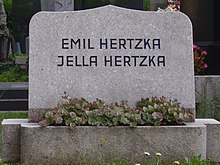Emil Hertzka
Emil Hertzka (born August 3, 1869 in Pest , Austria-Hungary , † May 9, 1932 in Vienna ) was an Austrian publisher. From 1907 to 1932 he was director of the Viennese music publisher Universal Edition .
Life
Emil Hertzka first studied chemistry and then music and literature at the University of Vienna until he had to give up chemistry for health reasons. In 1893 he began to work for the music publisher Josef Weinberger , was then managing director of the publishing house Gustav Lewy & Co and in 1901 switched to the music publisher Universal Edition-AG (UE), a stock company founded in the same year , to which Josef Weinberger and others also belong Music publisher Bernhard Herzmansky (Doblinger) participated. In 1907 Hertzka became director and remained so until his death in 1932. While UE had a more traditional and classical publishing program in the first few years, under his leadership the UE became one of the most important publishers for contemporary European music and thus shaped the company to the present day.
In 1909 he signed his first contracts with contemporary composers, namely with Gustav Mahler , Arnold Schönberg and Franz Schreker , whose opera Der ferne Klang was UE's first stage work. He also took over a large part of Anton Bruckner's works from the Albert J. Gutmann publishing house . Little by little he was able to meet the most important living composers of the time, such as Karol Szymanowski , Franz Schmidt , Egon Wellesz , Alban Berg , Anton Webern , Alexander Zemlinsky , Alfredo Casella , Leoš Janáček , Béla Bartók , Zoltán Kodály , Kurt Weill , Hanns Eisler , Ernst Krenek , Josef Matthias Hauer , Darius Milhaud or Gian Francesco Malipiero to the publisher.
But he also broke new ground with the sheet music editions: from 1912 the publishing house worked on the publication of the splendid edition “Klassiker der Tonkunst”. From 1919 to 1938 the publishing house published the series of " Monuments of Music in Austria " founded in 1894 and supervised it with the editor Guido Adler up to the 83rd volume in 1938. Another innovation was the book publishing division, where, in addition to individual music theory publications, such as Schönberg's “Harmony theory” or the work analyzes by Wöss and Specht , important periodicals appeared: the “ Musikblätter des Anbruch ” (1919–1937) or “ Pult und Beatstock ” (1924–1930).

At the time of Hertzka's death, he died of a heart condition in the Löw Sanatorium in Vienna after a short, serious illness , the publisher's catalog contained around 10,000 titles. His grave is in the Döblinger Friedhof (Israelite Department; Group I4, Row 3, No. 1A).
In memory of Hertzka, an annual composition prize was awarded from 1933 to 1937 . His wife Yella Hertzka (1873–1948), b. Fuchs, ran the publishing house after his death until the "Anschluss" of Austria in 1938 and after her return from forced exile from 1946 until her death.
In 1959, Emil-Hertzka-Platz in Vienna- Favoriten (10th district) was named after him.
Quote
In the foreword to the UE Yearbook 1926, which was published under the title "25 Years of New Music", Emil Hertzka wrote in the foreword:
- “A quarter of a century of restless work is behind us. Looking back is a respite. Our goal is still a long way off and there is a long way to go. We take it easy, carefree, because we go with the youth. We allow ourselves to be guided by it and wander with it without hesitation on untrodden, thorny paths. We feel that she always finds the right way forward. The belief in the youth, the joy that we have already become something for them, and the hope that we will be able to become much more to them, give us the strength to go on unperturbed. "
literature
- Hertzka Emil. In: Austrian Biographical Lexicon 1815–1950 (ÖBL). Volume 2, Verlag der Österreichischen Akademie der Wissenschaften, Vienna 1959, p. 293.
- 25 years of new music . Universal Edition yearbook 1926. Edited by Hans Heinsheimer and Paul Stefan . Universal Edition, Vienna a. a. 1926.
- Universal Edition (Ed.): Anbruch. Monthly magazine for modern music . 14th year, issue 4, April / May 1932, unpaginated and unsigned supplement on the death of Emil Hertzka. Universal Edition, Vienna 1932.
- 75 years of Universal Edition (1901–1976) . Catalog for the exhibition of the Vienna City and State Library in the Historical Museum of the City of Vienna. December 1976 - January 1977. Edited by Ernst Hilmar . Universal Edition, Vienna 1976, ISBN 3-7024-0121-0 .
- Helmut Brenner / Reinhold Kubik: Mahler's people. Friends and companions. St. Pölten - Salzburg - Vienna 2014, pp. 99-103, ISBN 978-3-7017-3322-4 .
- Felix Czeike (Ed.): Hertzka Emil. In: Historisches Lexikon Wien . Volume 3, Kremayr & Scheriau, Vienna 1994, ISBN 3-218-00545-0 , p. 161 ( digitized version ).
- Elisabeth Th. Hilscher-Fritz: Hertzka, married couple. In: Oesterreichisches Musiklexikon . Online edition, Vienna 2002 ff., ISBN 3-7001-3077-5 ; Print edition: Volume 2, Verlag der Österreichischen Akademie der Wissenschaften, Vienna 2003, ISBN 3-7001-3044-9 ., P. 743.
Web links
- Entry on Emil Hertzka in the Austria Forum (in the AEIOU Austria Lexicon )
- Universal Edition publishing history
- Institute with a cultural mission. About Emil Hertzka. Retrieved December 3, 2018.
annotation
- ↑ The list follows the chronological order of binding to the Universal Edition.
| personal data | |
|---|---|
| SURNAME | Hertzka, Emil |
| BRIEF DESCRIPTION | Austrian publisher |
| DATE OF BIRTH | August 3, 1869 |
| PLACE OF BIRTH | Pest , Austria-Hungary |
| DATE OF DEATH | May 9, 1932 |
| Place of death | Vienna |
